The village in Maharashtra has continuously sent soldiers to the army since World War I. Every other person you meet is a soldier or a retired soldier or is aspiring to be a soldier.
Text: Archana Masih/Rediff.com
Photographs: Rajesh Karkera/Rediff.com
Editorial consultant: Air Commodore Nitin Sathe (retd).
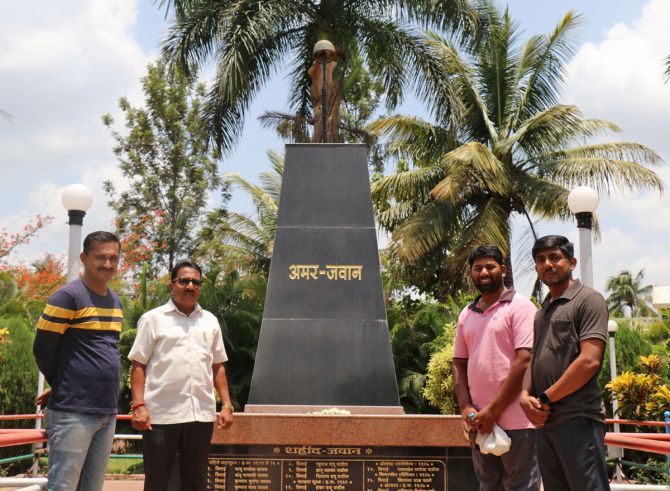
The highway has long been left behind and we are on a narrow road that runs between lush green sugarcane fields. The road is quiet, only a few motorcycles pass by as we make our way looking for Sainik Takli -- which literally means the 'village of soldiers' in Shirol taluka, Kolhapur district of Maharashtra.
The village is surrounded by four rivers. The sugarcane will be ready for harvesting in November. The few houses on either of the road are neatly kept with some plants in the front and a motorcycle or small car parked outside. They bear the look and feel of homes built by ex-servicemen for their families.
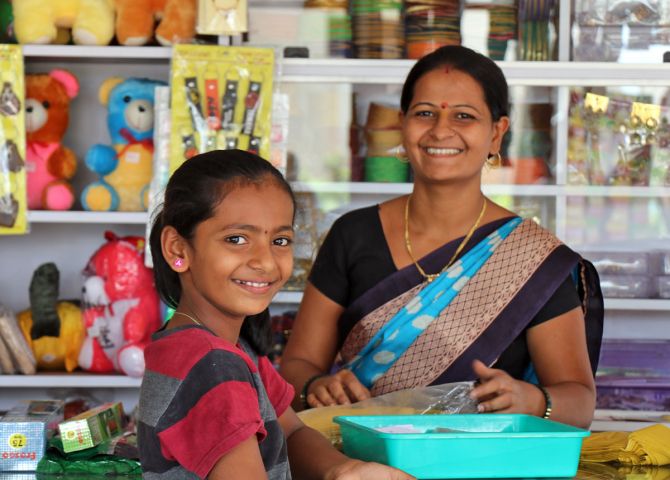
Vinod Patil's all in one store that neatly stocks biscuits to bindis to soaps to plastic cups to sketch pens sits at the entrance of the village.
Vinod descends from a family of soldiers; his father served as a driver to six army chiefs -- from General Sam Manekshaw to General Arun Vaidya, he says and remembers meeting General Vaidya -- an exceptional general who was assassinated in Pune soon after his retirement in 1986.
Pulling out stools for us to sit, he says between 1400-1500 ex and serving faujis live in the village. Vinod has started a training institute for young army aspirants and has family members serving in the fauj. His young daughter Abhilasha is sitting in the shop with her mother and he hopes she will join the fauj someday.
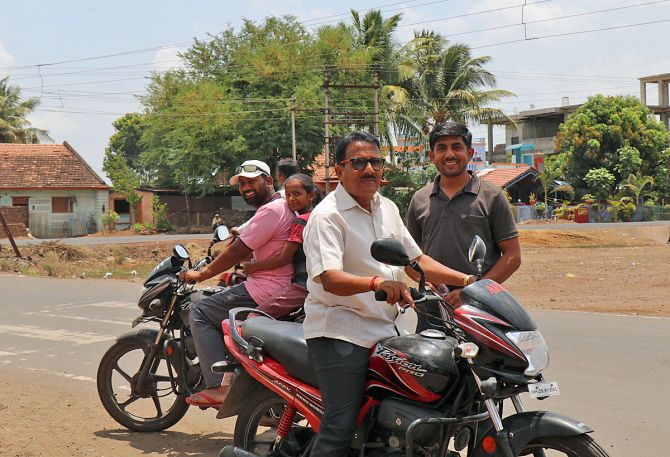
"Soldiers from our village have a 100-year-old tradition of serving in the Indian armed forces. There are four roads that go out of this village and every morning you will see students running on these roads in preparation for the armed forces," he says.
In between the conversation, he makes two-three quick phone calls, asking those at the other end to come to the shop to tell the visitors more about the military tradition of their village.
It is almost lunch time, but people are generous with their time and gracious in their manner -- an endearing quality that one encounters across villages and small-town India.

Sainik Takli is a village predominantly of the Marathas, a martial race which forms the core of the Maratha Light Infantry, one of the oldest regiments of the Indian Army. The regimental centre in Belagavi is around three hours away. 'Bolo Chhatrapati Shivaji Maharaj ki Jai' is the regiment's battle cry in war.
Retired Subedar Major Patil Baban arrives with just retired Havildar Deepak Patil.
Havildar Deepak looks too young to be called 'retired' and is preparing for banking exams. He has served in Jammu and Kashmir, Arunachal Pradesh, Punjab and a year's stint in South Sudan as a UN Peacekeeper.
His brother is currently serving in the army and Havildar Deepak shares memories of his experience in war-torn South Sudan.
Jawans retire young and many sit for the banking competitive examination. "In the navy and air force, men get more time to prepare before they are due to retire, but in the infantry we are posted at the front and therefore do not have much time to study," he says in a measured voice.

All those we speak to are retired soldiers -- and they all carry the ethos of the armed forces with them.
Subedar Major Baban, a soft spoken soldier, served in military intelligence in diverse stations like Pune, Nagaland, Delhi, J&K, Patiala and Tezpur.
Subedar Majors command enormous respect and serve as father figures to young jawans in a unit. They are the glue that bind men in an infantry battalion and Subedar Major Baban appears to do the same now among the village folk.
His son is in Class 10 and preparing for the entrance examination for the National Defence Academy.
The men speak about the memorial garden erected by the Sainik Kalyan Mandal in the village to honour the 18 men from Sainik Takli who were killed in action and express concern about the lack of funds for its upkeep.

The afternoon is hot and it is perhaps siesta time in the village, but they patiently delve into stories of the past -- about men from this patch of land that served in World War I, World War II, Subhas Chandra's Bose's Indian National Army and the Indian Army.
The village used to be called just 'Takli', but when then army chief General P P Kumaramangalam visited the village along with Lieutenant General Moti Sagar in 1968, he said in view of the village's contribution to the army, it should be called 'Sanik Takli'.
The name has stuck since.

As we talk in the verandah of the shop, bordered by sugarcane fields, 2-3 customers drop by and passing bikers wave to those sitting at the shop -- everyone seems to know everyone.
Shubham Patil, 20, stops to buy some cold drinks and plastic glasses. Shubham says he had tried the army recruitment camp for jawans at least 20 times, but did not succeed. "I even tried for the BSF and Assam Rifles [paramilitary forces], but now I have crossed the age limit. If I had age on my side, I would still keep trying," he says.
Shubham too has family members serving in the ranks of the Indian Army.
"Physical and written tests are not easy and they are unable to make it because competition is tough. There is no information here about other jobs. Hence if they cannot make it to the army, they do not have the knowledge about alternative careers," rues Subedar Major Baban Patil.
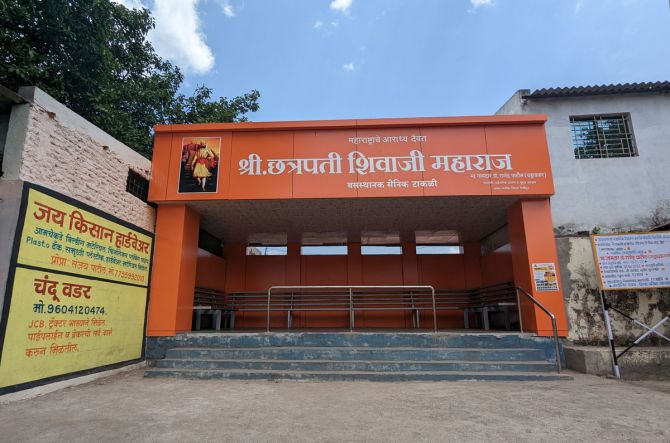
The group of former soldiers then usher us to the memorial to the 18 kinsmen from the village who sacrificed their lives for the country.
They ride on two motorbikes, two on each and are joined by another retired soldier at the gate of the Amar Jawan Udyan. It is evident that the memorial was a 'must visit' spot for the few who stop by at Sainik Takli.
The memorial is a granite pillar with a helmet resting on an inverted rifle and the names of the 18 brave men killed in action in both the World Wars, the 1962, 1965 and 1971 Wars, the Indian Peacekeeping Mission in Sri Lanka, Kashmir, the Siachen Glacier and Assam.
They pluck a few flowers in the garden that have survived the brutal summer sun and place them with silent respect. Vinod Patil takes off his cap and stands with his hands folded, head bent.
The memorial garden is a large space with a hall at one end for functions. The open ground near the school nearby is the venue for the Republic Day and Independence Day parades. "People from neighbouring villages come to see our parade," says Vinod Patil making his way out of the garden gate which has posters of a cricket tournament.

Retired Havildar Janardan Patil, also recently retired, revvs his motorbike with a number plate that read 11. "I paid Rs 5,000 extra for getting that particular number because I belong to 11 Marathas. This is for my beloved unit," he says, pride tinged with nostalgia.
As the three who accompanied us bid us goodbye from the memorial garden, Subedar Major Patil takes us to the home of retired Naik Bharatkumar Bapurao Jadhav whose family has served the fauj for five generations. His son is currently deployed in Galwan and had just returned to his unit on the China border the previous day after a few weeks leave.
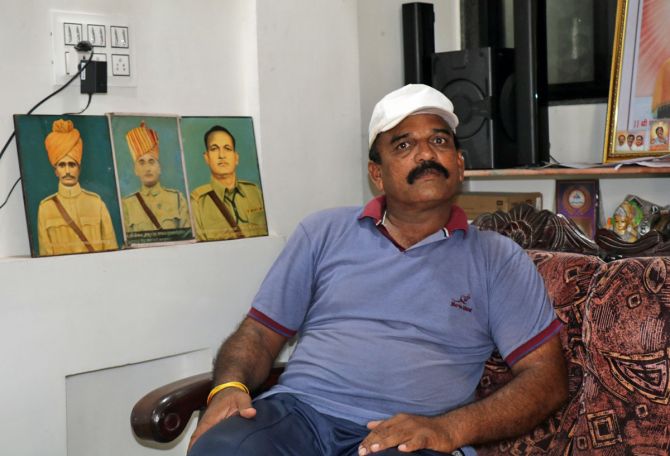
Naik Jadhav is a pleasant host who offers us water and nimbu paani and shows us newspaper cutting in Marathi documenting his proud military lineage which began with his great grandfather Raosahib Jadhav serving in World War I.
Grandfather Gyandev Jadhav fought in World War II and then joined Subhas Chandra Bose's Indian National Army.
Father Captain Bapurao Jadhav served in the 1965 and 1971 wars with Pakistan.
Naik Jadhav himself retired in 2001 and works as a security officer at a factory.
His son Akshay Jadhav joined the army as a sepoy in 2014. Naik Jadhav's drawing room has large framed photographs of his ancestors in military uniform. He shows us clippings of the family's entry into the Maharashtra Book of Records which noted that the family had given 14 soldiers to the armed forces.

As we talk in his home, we are joined by Manohar Bhonsale, a writer from the village who has written a book about the military tradition of Sanik Takli.
"I researched about 1,200 soldiers who had roots in this village," says Mr Bhonsale who was encouraged to write the book by the late Captain Bapurao Jadhav.
He kindly presents the book written in Marathi as the group of retired soldiers accompany us out to the road. They recommend that we stop by at the 12th century Kopeshwar temple at Khidrapur, 8 km away.

"There is no other village with such a long military tradition," says Mr Bhonsale.
So much of what they had learnt in the fauj still resides in these soldiers; each one has brought it back to their village. It is an honour to share that ground with them, even for a little while.










